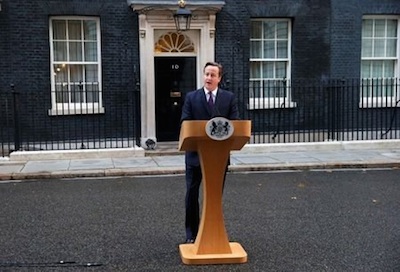
Scotland is to remain under London rule after voters rejected Thursday’s independence referendum by 55 per cent to 45 per cent.
With all of the 32 constituencies now declared, the Yes side has 1,617,989 votes and the No side 2,001,926. No wins by 55.3% to 44.7% Turnout was close to 90 per cent in some areas.
Speaking as counting was concluding this morning, British prime minister David Cameron warned pro-independence campaigners to cease their activity and claimed the Scottish independence debate had been “settled for a generation”.
He claimed there would be “no re-runs, no disputes” and now was time “for our United Kingdom to come together and to move forward”.
Speaking on the steps of Downing Street, Mr Cameron said promises of Scottish Home Rule made late in the campaign would be kept, but did not say when. Those promises appeared to have a sharp effect on the final outcome, with the ‘Yes’ campaign falling away from an overall majority in the final days.
The strength of the ‘Yes’ campaign had forced the British establishment into a ‘carrot and stick’ approach to Scottish voters, with promises of devolution issued alongside warnings of harsh economic measures against an independent Scotland.
Cameron spoke of complicated legislation and a need for “fairness” for the English, the Welsh and the Northern Irish.
The result was confirmed shortly before 7am when the head of the No campaign, Alistair Darling, said “the silent had spoken”.
An hour earlier, Scottish Nationalist Party leader Alex Salmond appeared on a stage in Edinburgh amid international acclaim for his efforts in advancing Scotland’s cause. He indicated he would continue to campaign for independence. and hinted the Edinburgh assembly might seek another referendum in the years ahead.
He also insisted that the pledges of greater self-government be delivered by the Westminster parliament within months.
“Scotland will expect these to be honoured in rapid course - as a reminder, we have been promised a second reading of a Scotland Bill by March 27th next year,” he said.
“Not just the 1.6 million Scots who voted for independence will demand that timetable is followed but all Scots who participated in this referendum will demand that timetable is followed,” he said.
“Whatever else we can say about this referendum campaign, we have touched sections of the community who have never before been touched by politics, these sections of the community have touched us and touched the political process.
“I don’t think that will ever be allowed to go back to business as usual in politics again.”
In a rallying call, Mr Salmond urged the ‘Yes’ voters to reflect on how far they had come.
“I don’t think any of us, whenever we entered politics, would have thought such a thing to be either credible or possible,” he said.
“Today of all days as we bring Scotland together, let us not dwell on the distance we have fallen short, let us dwell on the distance we have travelled and have confidence the movement is abroad in Scotland that will take this nation forward and we shall go forward as one nation.”
The following is the full count result:
Council Electorate Yes No Aberdeen City 175,745 41.39% 58.61% Aberdeenshire 206,486 39.64% 60.36% Angus 93,551 43.68% 56.32% Argyll & Bute 72,002 41.48% 58.52% Clackmannanshire 39,972 46.20% 53.80% C. nan Eilean Siar 22,908 46.58% 53.42% Dumfries/Galloway 122,036 34.33% 65.67% Dundee City 118,729 57.35% 42.65% East Ayrshire 99,664 47.22% 52.78% E. Dunbartonshire 86,836 38.80% 61.20% East Lothian 81,945 38.28% 61.72% East Renfrewshire 72,981 36.81% 63.19% Edinburgh 378,012 38.90% 61.10% Falkirk 122,457 46.53% 53.47% Fife 302,165 44.95% 55.05% Glasgow 486,219 53.49% 46.51% Highland 190,778 47.08% 52.92% Inverclyde 62,481 49.92% 50.08% Midlothian 69,617 43.70% 56.30% Moray 75,170 42.44% 57.56% North Ayrshire 113,923 48.99% 51.01% North Lanarkshire 268,704 51.07% 48.93% Orkney Islands 17,806 32.80% 67.20% Perth & Kinross 120,015 39.81% 60.19% Renfrewshire 134,735 47.19% 52.81% Scottish Borders 95,533 33.44% 66.56% Shetland Islands 18,516 36.29% 63.71% South Ayrshire 94,881 42.13% 57.87% South Lanarkshire 261,157 45.33% 54.67% Stirling 69,033 40.23% 59.77% W. Dunbartonshire 71,109 53.96% 46.04% West Lothian 138,226 44.82% 55.18%
![[Irish Republican News]](https://republican-news.org/graphics/title_gifs/rn.gif)
![[Irish Republican News]](https://republican-news.org/graphics/title_gifs/harp.gif)

